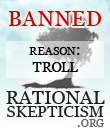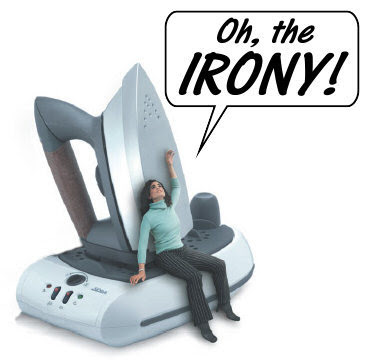Evidence and Faith
Moderators: kiore, Blip, The_Metatron
Evidence and Faith
Evidence only gives us a certain level of information. We still have to frame an interpretation based on the evidence; and then we have to decide whether we believe our interpretation to be true.
Faith is being certain of something that we cannot know for sure. It is choosing to believe something for which we don't have an airtight case or proof.
If a person, for example, believes that evolution theory is true. Is that not a faith commitment, because the proof is not airtight or beyond doubt?
Faith is being certain of something that we cannot know for sure. It is choosing to believe something for which we don't have an airtight case or proof.
If a person, for example, believes that evolution theory is true. Is that not a faith commitment, because the proof is not airtight or beyond doubt?
-

reddix - RS Donator
- THREAD STARTER
- Posts: 5721
- Age: 14

Re: Evidence and Faith
rezling wrote:Evidence only gives us a certain level of information. We still have to frame an interpretation based on the evidence; and then we have to decide whether we believe our interpretation to be true.
Faith is being certain of something that we cannot know for sure. It is choosing to believe something for which we don't have an airtight case or proof.
If a person, for example, believes that evolution theory is true. Is that not a faith commitment, because the proof is not airtight or beyond doubt?
Faith gives no information, it is just a hope that may not come to pass. If you are using that as an argument against science, then it is an absolute fail.
The scientific method is not about absolute proof, it is about tentatively accepting a theory based on all currently available evidence, both for and against. If any contrary evidence is found against a theory, then the theory must be modified and/or rejected. [Depending on the seriousness of the anomaly, and if it can be explained parsimoniously within the model].
As science does not claim absolute truth or absolute proof, then that alone makes science more credible, never mind the mechanisms in place [such as peer review and the null hypothesis] that greatly help to prevent/reduce confirmation bias.
Science works. It is highly descriptive and predictive, and [very often] explanatory. Because science works, the pre-suppositions of science appear to be valid, although, of course, not absolutely proven.
Religions make absolute claims of proof, and "fact", but have no evidence for these baseless claims. They have to be accepted on faith, even in defiance of evidence and logic.
Imperfect as science is, it is a superior mechanism for discovering nature. Faith claims are just brain farts about wishing for a better world than what we find ourselves in, and a total denial of reality.
Scientists do not accept theories as a matter of faith. No true scientist "believes" in the theory of evolution in the way that you may be implying. Scientists accept theories is they are robustly supported by the evidence. Intellectual honesty and intellectual rigour are the watchwords of science, not faith, blind or otherwise.
Jayjay4547 wrote:
"When an animal carries a “branch” around as a defensive weapon, that branch is under natural selection".
"When an animal carries a “branch” around as a defensive weapon, that branch is under natural selection".
- Darwinsbulldog
- Posts: 7440
- Age: 69
Re: Evidence and Faith
Excellent answer.
Accepting evolution as fact is easy. So much evidence for it has been found, and it grows every day.
If someone finds an even better way to explain it that fits the facts, we switch.
Faith can't do that.
It's always fun to bring up gravity as well. Rezling, do you "believe" in gravity? We know it happens, and can calculate it, but we don't really have a sound theory of gravity that is as strong as the theory of evolution.
Accepting evolution as fact is easy. So much evidence for it has been found, and it grows every day.
If someone finds an even better way to explain it that fits the facts, we switch.
Faith can't do that.
It's always fun to bring up gravity as well. Rezling, do you "believe" in gravity? We know it happens, and can calculate it, but we don't really have a sound theory of gravity that is as strong as the theory of evolution.
Healing the sick, casting out demons, and raising the dead since the first century...
-

Apollonius - Posts: 762

Re: Evidence and Faith
Yes, I believe in gravity, but that's not really what I'm saying. The evidence only comes close and then it takes faith in a theory to make it the rest of the way. A theory could be wrong so it takes a measure of faith, in the evidence or the theory, to believe it is true.
-

reddix - RS Donator
- THREAD STARTER
- Posts: 5721
- Age: 14

Re: Evidence and Faith
rezling wrote:Evidence only gives us a certain level of information. We still have to frame an interpretation based on the evidence;
Oh dear, not the tiresome "interpretation" canard so beloved of creationists. Which is specious for one simple reason.
If someone erects an "interpretation" that happens to be at variance with reality, then reality will eventually drive a tank battalion all over it. This is how bad postulates are weeded out - because reality says they are wrong. Science works on the basis that sooner or later, reality will tell them which postulates are bad, and which ones are good. This is why scientists pay attention to reality. As a result, the only "interpretation" that matters is whichever one reality tells us is sound, and this is what scientists spend their lives looking for.
rezling wrote:and then we have to decide whether we believe our interpretation to be true.
Wrong. Once again, all we have to do is wait for reality to tell us that our view of the real world is wrong, and force us back to the drawing board. An excellent historical example being provided by the need for physicists to abandon Newtonian mechanics as the best working hypothesis for the behaviour of moving objects, and switch to a relativistic mechanics instead, when reality started introducing us to phenomena that were beyond the remit of Newtonian mechanics to explain. Moreover, when Einstein provided that replacement relativistic explanation, it contained within it the reason why Newtonian mechanics had been so successful for so long - namely, because the error inherent in the Newtonian view was so small for objects moving at everyday speeds that it couldn't be measured. Even today, in order to measure that error for everyday objects moving at speeds up to and including those of jet aircraft, physicists have to resort to extremely sophisticated technology. Indeed, there is a precise mathematical statement which quantifies the error, in the form of the Lorentz Gamma factor, defined as:
γ(v) = (1-(v2/v2))-½
For objects moving at everyday speeds, γ(v) is extremely close to 1, and in many instances only differs from 1 in the 15th decimal place or lower. It doesn't even start to differ earlier than the 10th decimal place from 1, for objects travelling at the speed of the Space Shuttle. In order for γ(v) to be significantly different from 1, one needs to be travelling at a significant fraction of the speed of light.
Now, when Newton framed his original mechanics, he did so in an era when the fastest form of transport was the horse. Therefore he was unable to measure relativistic effects directly. Only when humans were able, as a result of developing the requisite technology on the back of Newton's earlier work, were they able to measure relativistic phenomena, and alight upon the fact that at speeds sufficiently close to light, Newton's ideas fail to work. This is how science proceeds, by using the extant paradigm for as long as it works, then moving on to a new one when it manifestly fails to work for a new class of observed real world phenomena, and which is precisely what science did when moving from Newton to Einstein. But, once again, the ultimate arbiter deciding whether this was necessary or not was the real world, which is always the ultimate arbiter of whether or not a scientific theory is valid.
rezling wrote:Faith is being certain of something that we cannot know for sure.
Wrong. Faith consists of uncritical acceptance of unsupported assertions. The moment a given postulate enjoys evidential support from the real world, it ceases to be an unsupported assertion, and therefore faith no longer applies.
rezling wrote: It is choosing to believe something for which we don't have an airtight case or proof.
Wrong. See above. Also, learn once and for all the distinction between proof, which is only applicable to formal axiomatic systems, such as those extant in mathematics, and evidential support, which is the means by which postulates about the real world are either verified or refuted.
rezling wrote:If a person, for example, believes that evolution theory is true.
Yawn. Not this tiresome canard again ... allow me to explain why this is a canard.
First of all, let us cover the proper, rigorous definition of 'theory', as used by scientists. namely:
A theory is an integrated explanation for a class of real world observational phenomena of interest, that has been subject to empirical test with respect to its correspondence with observational reality, and found via such testing to be in accord with observational reality.
In other words, in the world of science, a theory is the very antithesis of a "guess", precisely because it has been subject to critical test, and found via experiment to be in accord with reality. Consequently, since empirical evidence exists supporting that theory, faith is superfluous to requirements and irrelevant. No one "believes" in a scientific theory, because belief itself simply does not apply when evidence is available to support that theory. The only time that belief applies to a postulate is when that postulate remains unsupported by any real world evidence.
Since there exists a vast mountain of evidence supporting evolutionary theory, belief is superfluous to requirements and irrelevant.
rezling wrote:Is that not a faith commitment, because the proof is not airtight or beyond doubt?
No. Once again, read the above, paying particular attention to [1] the distinction between proof and evidential support, [2] the rigorous definition of 'theory' extant in science, and [3] the relationship between postulates and the real world.
I think this is sufficient.
Signature temporarily on hold until I can find a reliable image host ...
-

Calilasseia - RS Donator
- Posts: 22644
- Age: 62

- Country: England

Re: Evidence and Faith
Believing in Evolution or gravity isn't faith. Because if somehow they were to be falsified, we wouldn't believe them anymore.
Now take this Yawheh...
Now take this Yawheh...
Donuts don't wear alligator shoes!
-

josephchoi - Posts: 1094
- Age: 32

- Country: Ca...na... d- Canada.
Re: Evidence and Faith
@ the OP,
if you want to make them squirm and commit them to positions not entirely justified by 'reasonable' grounds, then base your arguments from those of the epistemological skeptics. Arguing with these skeptics is like trying to strangle an eel.
if you want to make them squirm and commit them to positions not entirely justified by 'reasonable' grounds, then base your arguments from those of the epistemological skeptics. Arguing with these skeptics is like trying to strangle an eel.
Christ said, "I am the Truth"; he did not say "I am the custom." -- St. Toribio
-

Mick - Banned Troll
- Posts: 7027
Re: Evidence and Faith
Mick wrote:@ the OP,
if you want to make them squirm and commit them to positions not entirely justified by 'reasonable' grounds, then base your arguments from those of the epistemological skeptics. Arguing with these skeptics is like trying to strangle an eel.
Strangling an eel is easy. Stick your fingers down its gills.
A most evolved electron.
-

Animavore - Name: The Scribbler
- Posts: 45108
- Age: 45


Re: Evidence and Faith
Mick wrote:@ the OP,
if you want to make them squirm and commit them to positions not entirely justified by 'reasonable' grounds, then base your arguments from those of the epistemological skeptics. Arguing with these skeptics is like trying to strangle an eel.

Donuts don't wear alligator shoes!
-

josephchoi - Posts: 1094
- Age: 32

- Country: Ca...na... d- Canada.
Re: Evidence and Faith
?
Christ said, "I am the Truth"; he did not say "I am the custom." -- St. Toribio
-

Mick - Banned Troll
- Posts: 7027
Re: Evidence and Faith
What part of a belief in a completely non-evidenced, and unnecessary being in all counts counts as "reasonable"?
Donuts don't wear alligator shoes!
-

josephchoi - Posts: 1094
- Age: 32

- Country: Ca...na... d- Canada.
Re: Evidence and Faith
Just because a person believes in something that the proof is not airtight or beyond doubt, that doesn't make it a flawed idea. I think evolution is a good theory, it's a strong one. But that doesn't mean it is absolutely airtight, and it could be wrong.
Faith does not equal ignorance or foolishness. It is simply part of being human. We all have a worldview through which we interpret and make sense of everything. That worldview is a faith system based on evidence.
I think absolutely certain knowledge is impossible except to prove a person's own existence.
Where absolute certainty is impossible, a measure of faith is required to believe your interpretation of the evidence and arguments you have gathered.There is no way to be absolutely certain that God does not exist. Therefore, for example, Atheism is a faith system based on an interpretation of the gathered evidence.
Faith does not equal ignorance or foolishness. It is simply part of being human. We all have a worldview through which we interpret and make sense of everything. That worldview is a faith system based on evidence.
I think absolutely certain knowledge is impossible except to prove a person's own existence.
Where absolute certainty is impossible, a measure of faith is required to believe your interpretation of the evidence and arguments you have gathered.There is no way to be absolutely certain that God does not exist. Therefore, for example, Atheism is a faith system based on an interpretation of the gathered evidence.
-

reddix - RS Donator
- THREAD STARTER
- Posts: 5721
- Age: 14

Re: Evidence and Faith
rezling wrote:Just because a person believes in something that the proof is not airtight or beyond doubt, that doesn't make it a flawed idea. I think evolution is a good theory, it's a strong one. But that doesn't mean it is absolutely airtight, and it could be wrong.
Faith does not equal ignorance or foolishness. It is simply part of being human. We all have a worldview through which we interpret and make sense of everything. That worldview is a faith system based on evidence.
I think absolutely certain knowledge is impossible except to prove a person's own existence.
Where absolute certainty is impossible, a measure of faith is required to believe your interpretation of the evidence and arguments you have gathered.There is no way to be absolutely certain that God does not exist. Therefore, for example, Atheism is a faith system based on an interpretation of the gathered evidence.
Oh dear.
Did you read my earlier post, where I covered these issues in detail?
Faith, defined rigorously, consists of uncritical acceptance of unsupported assertions. Therefore it does not apply to evidentially supported postulates.
Plus, the whole point of the scientific endeavour is to pay attention to reality without a priori presuppositions. Presuppositions, in the world of science, exist to be tested to destruction. Any "worldview" formed within science is therefore not based upon these, unlike world views based upon supernaturalism. There is, therefore, NO "symmetry" between the two, and the erection of a specious "symmetry" between science and religion is precisely that - specious. The difference between the two approaches could not be greater. Science starts with the basic question "what is reality telling us?", and asks the subsidiary (and very important) question, "how can we be sure we've learned properly what reality is telling us?". Religions start with one or more blind assertions, treat these as constituting "axioms" about the world, and formulate postulates upon this basis, regardless of whether or not reality supports those initial assertions that are being treated as "axioms".
Also, atheism is NOT a "faith based system", because atheism rejects the idea that faith itself constitutes a valid means of obtaining substantive knowledge about the world. Moreover, atheism in its rigorous formulation does not erect any postulates, it simply rejects the idea that blind assertions about invisible magic men erected by supernaturalists should be accepted, simply because supernaturalists or books of mythology insist that these assertions are true. Atheism is therefore the very antithesis of "faith", because it rejects the idea that these assertions should be considered as true in the absence of any supporting evidence for these assertions. Rejecting unsupported assertions isn't "faith", it's the proper conduct of rigorous discourse.
Signature temporarily on hold until I can find a reliable image host ...
-

Calilasseia - RS Donator
- Posts: 22644
- Age: 62

- Country: England

Re: Evidence and Faith
Rezling: Think about the progress you made in the 'ID Viable' thread, and try to apply some of the things you learned there to this. Faith is irrelevant an surplus to requirements.
- hackenslash
- Name: The Other Sweary One
- Posts: 22910
- Age: 54

- Country: Republic of Mancunia
Re: Evidence and Faith
Calilasseia wrote:Faith, defined rigorously, consists of uncritical acceptance of unsupported assertions. Therefore it does not apply to evidentially supported postulates.
I don't agree with this definition of faith. By that definition, one cannot believe anything. We can have a measure of certainty about something; but without absolute proof, there is at least a small measure of faith involved.
How can one be so sure that something is 'reality'? "I just follow the evidence" makes no sense to me. How does one know what they are reading is 'evidence'?
-

reddix - RS Donator
- THREAD STARTER
- Posts: 5721
- Age: 14

Re: Evidence and Faith
calilasseia wrote:
Faith, defined rigorously, consists of uncritical acceptance of unsupported assertions. Therefore it does not apply to evidentially supported postulates.
This is incorrect.
"Faith" as it is understood in Christianity comes from the greek pistis, which is translated as "to trust, to have confidence, faithfulness, to be reliable, to assure[1]". One can place value on evidence and still have faith. They are not mutually exclusive.
I think what you mean to critique is Fideism; which is "the name given to that school of thought—to which Tertullian himself is frequently said to have subscribed—which answers that faith is in some sense independent of, if not outright adversarial toward, reason.[2] " Note that fideism is not exclusive to religion.
[1] Thomas, Robert L.; Editor, General (1981). New American standard exhaustive concordance of the Bible :. Nashville, Tenn.: A.J. Holman. pp. 1674–75.
[2] http://plato.stanford.edu/entries/fideism/
"Believe nothing, no matter where you read it, or who said it, no matter if I have said it, unless it agrees with your own reason and your own common sense." -Siddhārtha Gautama
-

Nocterro - Posts: 322


Re: Evidence and Faith
.... How do you define faith while having a derivative of the word as part of the definition?
Donuts don't wear alligator shoes!
-

josephchoi - Posts: 1094
- Age: 32

- Country: Ca...na... d- Canada.
Re: Evidence and Faith
Nocterro wrote:calilasseia wrote:
Faith, defined rigorously, consists of uncritical acceptance of unsupported assertions. Therefore it does not apply to evidentially supported postulates.
This is incorrect.
"Faith" as it is understood in Christianity comes from the greek pistis, which is translated as "to trust, to have confidence, faithfulness, to be reliable, to assure[1]". One can place value on evidence and still have faith. They are not mutually exclusive.
Why not use the word Trust or Confidence then?
However you will soon trip up if asked on what basis you derive that Trust, since there is unlikely to be very much of substance behind it.
John
I don’t simply believe in miracles - I rely on them
- z8000783
- Name: WTF
- Posts: 9333
- Age: 70

- Country: Greece

Re: Evidence and Faith
rezling wrote:Calilasseia wrote:Faith, defined rigorously, consists of uncritical acceptance of unsupported assertions. Therefore it does not apply to evidentially supported postulates.
I don't agree with this definition of faith. By that definition, one cannot believe anything. We can have a measure of certainty about something; but without absolute proof, there is at least a small measure of faith involved.
How can one be so sure that something is 'reality'? "I just follow the evidence" makes no sense to me. How does one know what they are reading is 'evidence'?
Or you can just take the theory as being an as yet unfalsified approximation of reality. Something like Newton's law of gravity, or the spherical Earth theory provide very good descriptions of what happens and highly accurate predictions about what we will observe in typical everyday life.
It's only if you want to hold such a theory as being "ultimate truth" that you run into problems, and really one shouldn't be doing that anyway, I doubt any credible scientist thinks that Quantum Mechanics, the Theory of Evolution, General Relativity etc. are "ultimate truths" they are merely very reliable descriptions of the world we inhabit, that may later be updated by even more reliable descriptions.
-

Thommo - Posts: 27477
Re: Evidence and Faith
rezling wrote:Calilasseia wrote:Faith, defined rigorously, consists of uncritical acceptance of unsupported assertions. Therefore it does not apply to evidentially supported postulates.
I don't agree with this definition of faith. By that definition, one cannot believe anything. We can have a measure of certainty about something; but without absolute proof, there is at least a small measure of faith involved.
How can one be so sure that something is 'reality'? "I just follow the evidence" makes no sense to me. How does one know what they are reading is 'evidence'?
The sun has successfully managed to rise every day of your life. Is it really true to say you "have faith" that it will do so again tomorrow? Or can you say that based on the evidence of science, recorded history and your own experience, that the probability of it not doing so is so infinitesimally small that it is not worth worrying about? Amount of "faith" required is as close as dammit to 0.
Contrast that with the position that there is a heaven, say. Evidence... well bugger all, really, unless you are someone who counts the writings of mystics from millennia ago as "evidence". So the amount of faith needed to assert there is a heaven is as close as dammit to 100%.
Which category is evolution in?
-

virphen - Posts: 7288

Who is online
Users viewing this topic: No registered users and 1 guest